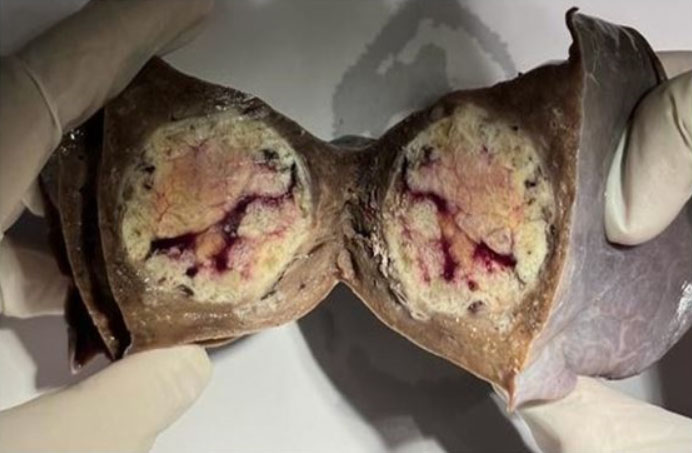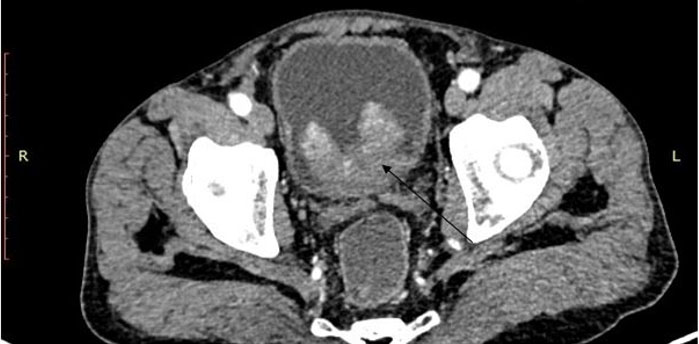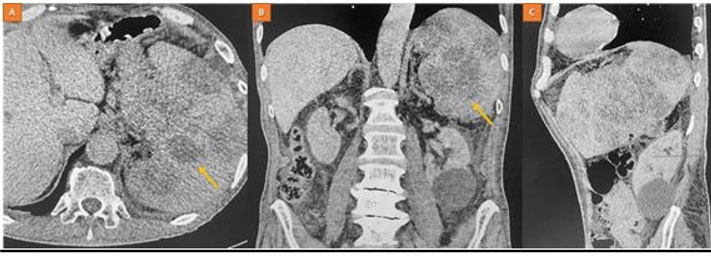 |
Case Report
A case of occult cancer of prostatic ductal adenocarcinoma in which urinary cytology and immunostaining led to identification of primary site
1 Director, Department of Pathology, Yao Tokushukai General Hospital, Yao, Osaka, Japan
2 Director, Department of Urology, Yao Tokushukai General Hospital, Yao, Osaka, Japan
3 Director, Department of Thoracic Surgery, Yao Tokushukai General Hospital, Yao, Osaka, Japan
4 Advisor, Department of Pathology, Yao Tokushukai General Hospital, Yao, Osaka, Japan
5 General Director, Department of Pathology, Yao Tokushukai General Hospital, Yao, Osaka, Japan
Address correspondence to:
Yuki Kubo
Department of Pathology, Yao Tokushukai General Hospital, 1-17 Wakakusa-cho, Yao, Osaka,
Japan
Message to Corresponding Author
Article ID: 100092Z11YK2025
Access full text article on other devices

Access PDF of article on other devices

How to cite this article
Kubo Y, Kanamaru T, Ichihashi Y, Nambu N, Terada N, Nakatsuka S. A case of occult cancer of prostatic ductal adenocarcinoma in which urinary cytology and immunostaining led to identification of primary site. J Case Rep Images Pathol 2025;11(2):1–5.ABSTRACT
Introduction: The diagnosis of prostatic occult cancer is often difficult. In particular, diagnosing ductal adenocarcinoma using pathological specimens sampled from metastatic sites is challenging because it has pathological features different from those of acinar adenocarcinoma, which is the most common histological subtype of prostate cancer. Here, we report a case of occult prostatic ductal adenocarcinoma in the lungs in which urine cytology first suggested primary prostate cancer.
Case Report: A man in his early 70s underwent lobectomy for a left-sided lung tumor. The initial pathological diagnosis was an enteric-type primary pulmonary adenocarcinoma (CDX2-positive and TTF-1-negative). The pathological diagnosis of recurrent lung tumors was the same as that of the initial diagnosis. During follow-up, urine cytology revealed prostatic adenocarcinoma, followed by a histological diagnosis of prostatic ductal adenocarcinoma by needle biopsy. Additional immunohistochemistry revealed that both the prostatic tumors and antecedent lung tumors demonstrated identical phenotypes (NKX3.1-positive, CDX2-positive, and TTF-1-negative); therefore, a final diagnosis of primary prostatic duct adenocarcinoma and pulmonary metastases was established.
Conclusion: Ductal adenocarcinoma of the prostate should be included in the differential diagnosis of tubulopapillary adenocarcinoma of unknown primary origin in elderly men, and the appropriate use of cytology and immunostaining can lead to a correct diagnosis.
Keywords: Ductal adenocarcinoma, Occult cancer, Prostatic cancer
SUPPORTING INFORMATION
Acknowledgments
We would like to thank Dr. Toyonori Tsuzuki (Aichi Medical University) for consultation with the histological diagnosis, and Ms. Yoshie Iwasaki, Yuko Nishikawa, Akari Tsubosa, and Mr. Kaito Muroki for cytological analysis. We also appreciate Editage (www.editage.jp) for the English language edition
Author ContributionsYuki Kubo - Conception of the work, Design of the work, Acquisition of data, Analysis of data, Drafting the work, Revising the work critically for important intellectual content, Final approval of the version to be published, Agree to be accountable for all aspects of the work in ensuring that questions related to the accuracy or integrity of any part of the work are appropriately investigated and resolved.
Tomohiro Kanamaru - Acquisition of data, Analysis of data, Revising the work critically for important intellectual content, Final approval of the version to be published, Agree to be accountable for all aspects of the work in ensuring that questions related to the accuracy or integrity of any part of the work are appropriately investigated and resolved.
Yoshio Ichihashi - Acquisition of data, Analysis of data, Revising the work critically for important intellectual content, Final approval of the version to be published, Agree to be accountable for all aspects of the work in ensuring that questions related to the accuracy or integrity of any part of the work are appropriately investigated and resolved.
Naoko Nambu - Acquisition of data, Revising the work critically for important intellectual content, Final approval of the version to be published, Agree to be accountable for all aspects of the work in ensuring that questions related to the accuracy or integrity of any part of the work are appropriately investigated and resolved.
Nobuyuki Terada - Acquisition of data, Revising the work critically for important intellectual content, Final approval of the version to be published, Agree to be accountable for all aspects of the work in ensuring that questions related to the accuracy or integrity of any part of the work are appropriately investigated and resolved.
Shin-ichi Nakatsuka - Conception of the work, Design of the work, Acquisition of data, Analysis of data, Drafting the work, Revising the work critically for important intellectual content, Final approval of the version to be published, Agree to be accountable for all aspects of the work in ensuring that questions related to the accuracy or integrity of any part of the work are appropriately investigated and resolved.
Guarantor of SubmissionThe corresponding author is the guarantor of submission.
Source of SupportNone
Consent StatementWritten informed consent was obtained from the patient for publication of this article.
Data AvailabilityAll relevant data are within the paper and its Supporting Information files.
Conflict of InterestAuthors declare no conflict of interest.
Copyright© 2025 Yuki Kubo et al. This article is distributed under the terms of Creative Commons Attribution License which permits unrestricted use, distribution and reproduction in any medium provided the original author(s) and original publisher are properly credited. Please see the copyright policy on the journal website for more information.





